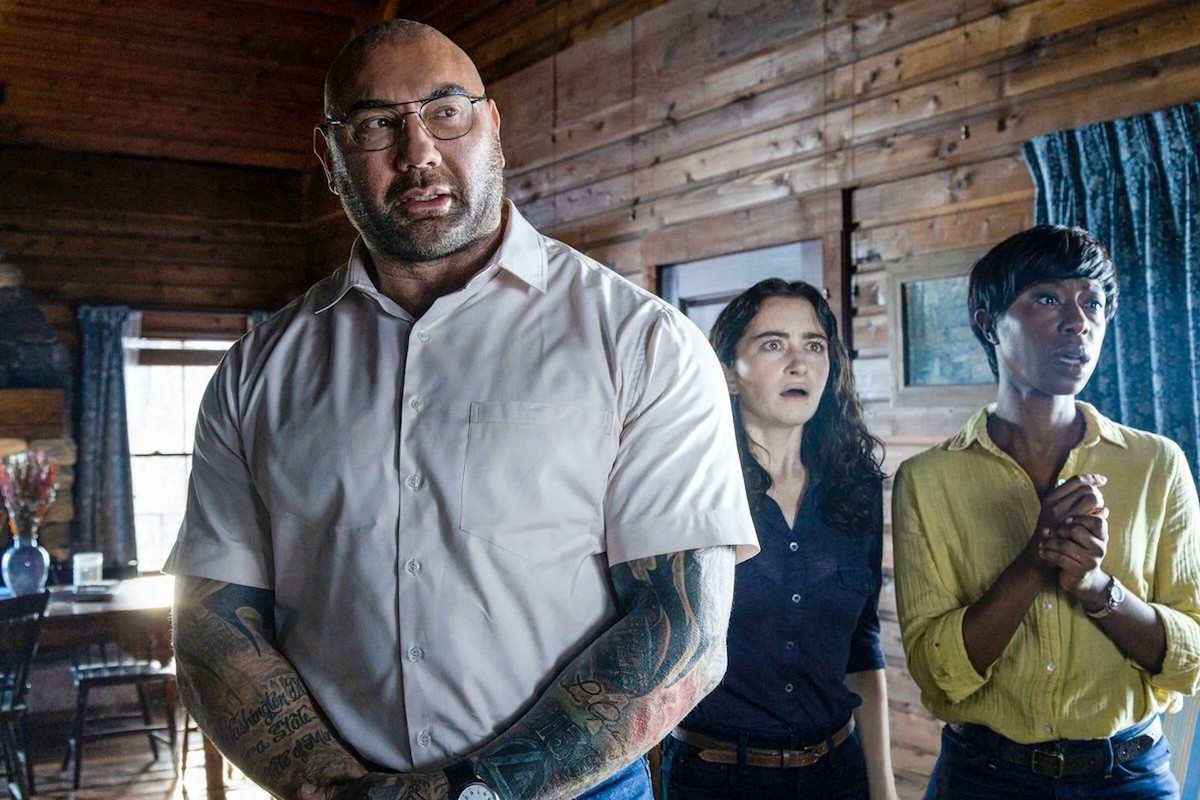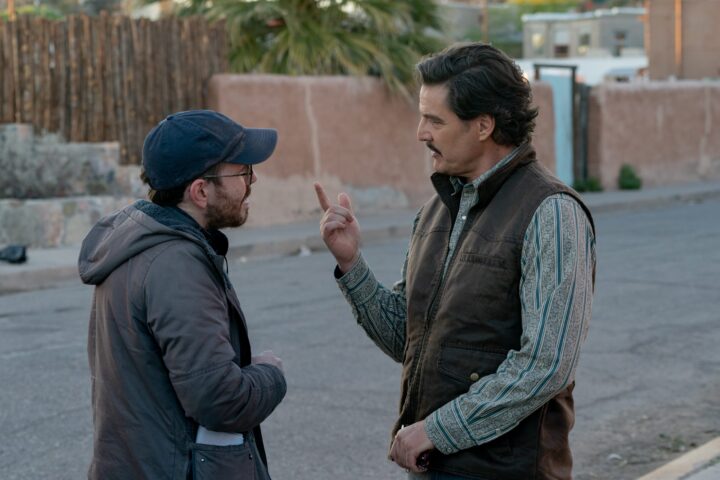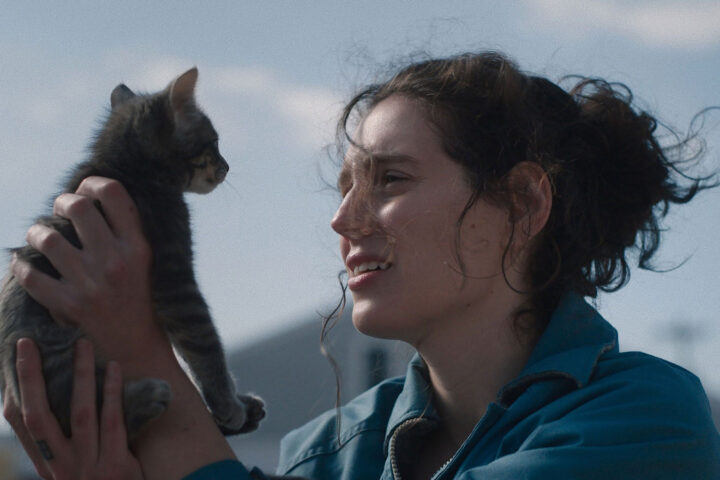M. Night Shyamalan’s Knock at the Cabin, about a life-or-death dilemma and impending apocalypse, is a thought-provoking exercise in tension open to a number of interpretations. Is it merely about a scary home invasion or the genuine threat of human extinction? Blind faith versus skepticism? The fates of believers and non-believers? A conservative view of a vengeful God? Liberal embrace of a nurturing gay marriage?
On the heels of 2021’s equally effective Old, the picture signifies a return to form for the filmmaker, whose 1999 breakout hit The Sixth Sense placed the him on the A-list map while shrouding his career in an onus of expectation. Consequently, two subsequent decades of films have struggled to measure up to his early career peak.
Not that this was entirely Shyamalan’s fault given the lofty expectation that he deliver high bar originality, vision and final reel twists on each subsequent outing. Sometimes he managed it and often not—while Signs realized one cinema’s most shivery alien invasions, psychological thriller Split was perhaps his scariest hour and Unbreakable his most original, ambition arguably and often got the best of him in a handful undercooked excursions like The Village, The Happening and The Lady in the Water.
The mostly enjoyable Knock at the Cabin belongs in the top half of his canon, taking a claustrophobic home invasion set-up—I was reminded at times of Michael Haeneke’s Funny Games in the inescapable hopelessness of the predicament—and spinning a mysterious rumination on faith, punishment, true believers, notions of cults, homophobia, family and true love. It provokes much and commits to little, leaving one screening audience member shouting expletives upon the closing credits.
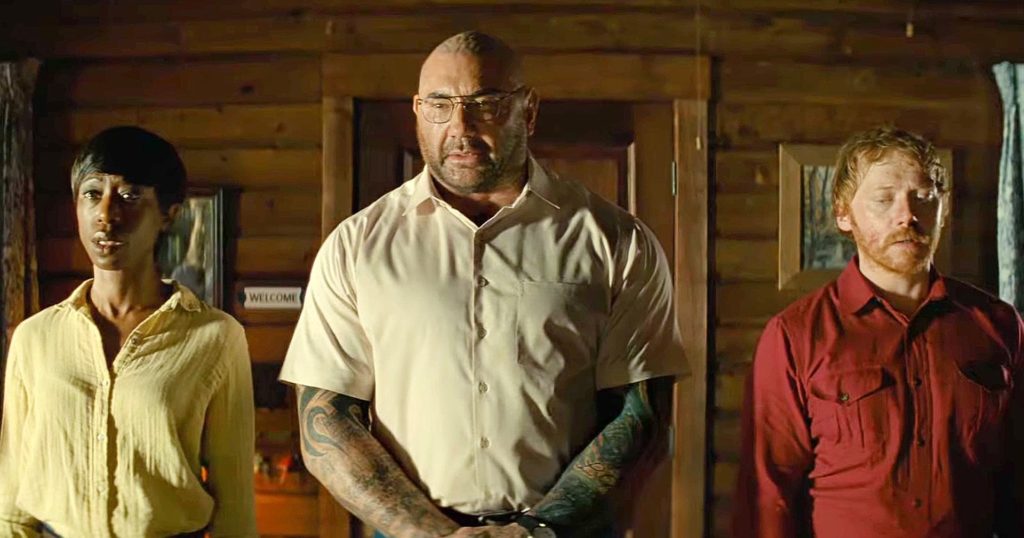
Picture opens on a spellbinding scene as young Wen (Kristen Cui), on a weekend cabin getaway with two dads Eric (Jonathan Groff) and Andrew (Ben Aldridge), encounters mysterious, hulking stranger Leonard (Dave Bautista), emerging from the wood. The kindly giant explains, softly, that he is about to do something awful to her family, apologizing in advance.
Alarmed Wen runs home to alert her dads, but within moments Leonard and a trio of menacing companions violently break into the cabin, overpowering the terrified family and leaving Eric severely concussed. They spin a credulity-stretching tale of the impending end of days, predicated on shared visions and prophecies they claim have drawn them together. Should their mission fail, humankind is destined to face a series of catastrophic plagues.
And that mission is to persuade this family to willingly commit a devil’s bargain. Eric, Andrew and Wen have been chosen as potential saviors of the human race. The price? To sacrifice one of their family in order to save every life on the planet. Should they decline this oblation, consecutive catastrophes shall rain upon mankind producing global extinction, leaving the family to walk the planet alone for eternity.
This naturally doesn’t go over well despite pleas from the very sincere invaders, including a compassionate nurse (Nikki-Amuka Bird), single mother (Abby Quinn) and potentially mysterious figure from the past (Rupert Grint). As Leonard warns, to resist the sacrifice means the seas will rise, global plagues will be unleashed and the sky will eventually fall, leaving the planet in blackness. Eric and Andrew reject the proposition as lunacy, believing the messengers to be cultists bent perpetrating a hate crime. For each of their rejections, one of the messengers must face a bloody self-sacrifice.
Shyamalan, with co-screenwriters Steve Desmond and Michael Sherman adapting the successful novel by Paul Tremblay, do a surprisingly good job filling in the married partners’ backstory in a series of flashbacks—Andrew’s parents’ inability to accept their relationship, the precarious adoption of daughter Wen, a gay bashing altercation—offering periodic respite from the cabin’s claustrophobic interior while illustrating a quietly novel portrait of unshakable gay commitment.
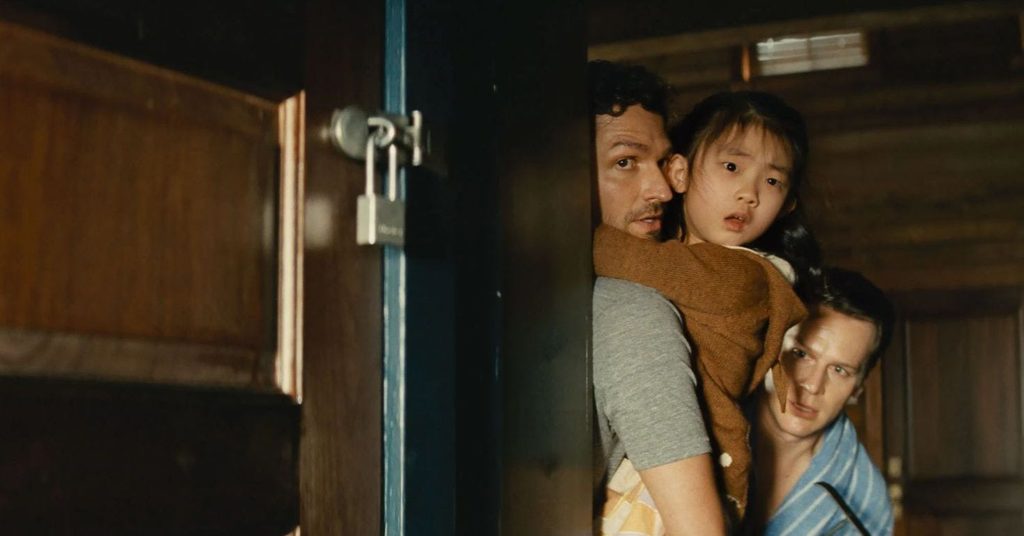
Knock at the Cabin is never fully transparent about the messengers’ origins or if their motivations are indeed altruistic. Perhaps Leonard, an elementary school teacher, athletics coach and part-time Chicago bartender, is most resolutely convincing. The terrific Bautista, who takes acting very seriously and knows the power of stillness and quiet in juxtaposition with his visage, here approaches something alternately menacing and ultimately poignant.
The picture’s first half is both gripping and a touch too schematic; at the 45-minute point the premise slightly downshifts. But just when it seems to be running out of gas in its inability to commit to what is objectively happening—are the messengers crazy cultists or genuinely prophetic?—the final half-hour ratchets up the emotional and survival dynamics for maximum impact. Viruses wipe out children everywhere, planes fall en masse from the sky and its tidal wave producing earthquakes would make Irwin Allen proud.
The biggest surprise in A Knock at the Cabin is not a signature Shyamalan “ending” but rather a depiction of a matter-of-fact gay marriage built on love, commitment and parental protection—both Groff and especially Aldridge, carrying the final scenes with intensity, create realistic characters believable in both their bonds and torments. Undoubtedly the film will rile some who may perceive its fire-and-brimstone biblical allusions to be manifest, God-fearing fundamentalism directed at punishing gays (an ultraconservative and, in my view, arch interpretation). For Andrew, determined to ferret out the homophobia he is certain must be driving this dangerous game, this reading affixes dimensions of paranoia to the proceedings, his history as a hate crime victim triggering anger issues and hypersensitivity to aggression.
With Knock at the Cabin, Shyamalan elicits strong performances, thought-provoking topics and genuine tension. Tech credits are solid including a successful exploitation of the confined locale by cinematographer Jarin Blaschke and darkly insinuating score from Herdís Stefánsdóttir.
3 stars.
